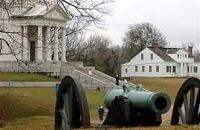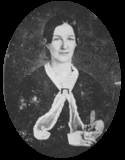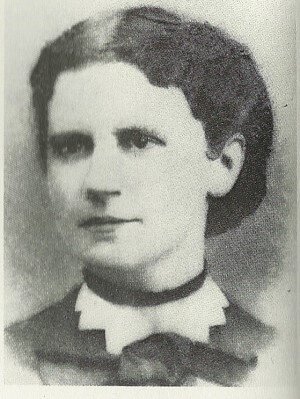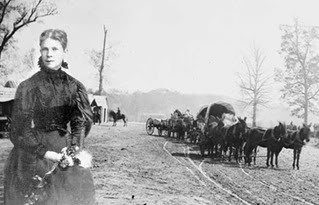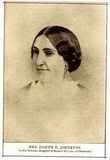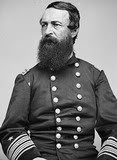Women Lived in Caves During the Siege of Vicksburg
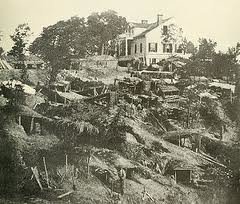 During the siege of Vicksburg, Mississippi in the summer of 1863, many residents of the city cut caves into the hillsides and lived in them. In these dark quarters, they lived in constant fear of the 220-pound mortar shells fired by the Union fleet on the Mississippi River. In 1864 Mary Loughborough published her experiences in My Cave Life in Vicksburg, and the account she wrote is the most vivid picture we have of cave life in the besieged city.
During the siege of Vicksburg, Mississippi in the summer of 1863, many residents of the city cut caves into the hillsides and lived in them. In these dark quarters, they lived in constant fear of the 220-pound mortar shells fired by the Union fleet on the Mississippi River. In 1864 Mary Loughborough published her experiences in My Cave Life in Vicksburg, and the account she wrote is the most vivid picture we have of cave life in the besieged city.
Image: The Shirley House in Vicksburg, 1863
During the siege this house was located directly in front of the Confederate fortifications and would have been burned by the Rebels if not for the owner, Mrs. Shirley, who refused to leave. Civilians lived in the caves that were dug into the hillside below the house.
During the Vicksburg Campaign in Mississippi in 1863 General Ulysses S. Grant won the Battle of Port Gibson on May 1 and moved quickly inland. From May 12 to May 17, Union forces won a battle at Raymond, captured Jackson and defeated CSA General John C. Pemberton’s main army at Champion Hill and the Big Black River.
Pemberton retreated into Vicksburg and Grant followed, arching his Union Army around the city from north to east to south, with the Union Navy on the river. As Pemberton’s dispirited army came into Vicksburg, many women, children and other noncombatants tried to leave, but with Confederate troops retreating into Vicksburg, and most of the roads out of town leading east into Grant’s army, many had to return.
Grant’s army tried twice to overwhelm Pemberton’s army, and, having failed, settled in for a siege of Vicksburg that ultimately lasted 47 days. Whatever their station, the women who were left in town struggled to survive. The women had to look out for themselves and try to keep their lives going while the war whirled around them. Their surviving letters and diaries tell stories of both physical and mental terror.
Originally from Missouri, Mary Webster Loughborough had fled south after pro-secession efforts failed in Missouri. At age twenty-seven, she had arrived in Vicksburg, Mississippi on April 15, 1863, with her husband, Major James Moore Loughborough of the Confederate Army, and their two-year-old daughter, not realizing she would end up trapped there during the siege of the city.
During the spring and summer of 1863, an unrelenting rain of Federal artillery shells rained upon the Hill City. Many residents cut caves into the hillsides and took up residence there for the duration of the siege. In these dark and dank quarters, older men, servants and women and children lived in constant fear of the descending messengers of death: 220-pound mortar shells, fired at the besieged city by the Union fleet on the Mississippi River to the west; and upwards of 30-pound artillery shells fired by the U.S. Army from the east, north and south.
In 1864 Loughborough published her experiences in My Cave Life in Vicksburg, and the account she wrote is the most thorough and vivid picture we have of cave life in the besieged city. The following passages are taken from her book.
Loughborough wrote vivid scenes of her experiences:
The caves were plainly becoming a necessity, as some persons had been killed on the streets by fragments of shells. Our policy in building had been to face directly away from the river. All caves were prepared, as near as possible, in this manner. As the fragments of shells continued with the same impetus after the explosion, in but one direction, onward, they were not likely to reach us, fronting in this manner with their course. The room that I had so lately slept in had been struck by a fragment of a shell during the first night, and a large hole made in the ceiling.
On one occasion, I was reading in safety, I imagined, when the unmistakable whirring of Parrott shells told us that the battery we so much feared had opened from the entrenchments. I ran to the entrance to call the servants in; and immediately after they entered, a shell struck the earth a few feet from the entrance, burying itself without exploding. I ran to the little dressing room, and could hear them striking around us on all sides. One fell near the cave entrance, and a servant boy grabbed it and threw it outside; it never exploded.
For Mary’s privacy and as a shield from the sun, a tent fly was stretched over the mouth of her cave:
Our new habitation was an excavation made in the earth, and branching six feet from the entrance, forming a cave in the shape of a T. In one of the wings my bed fitted [a narrow spring mattress camp bed]; the other I used as a kind of dressing room; in this the earth had been cut down a foot or two below the floor of the main cave; I could stand erect here; and when tired of sitting in other portions of my residence, I bowed myself into it, and stood impassively resting at full height – one of the variations in the still shell-expectant life… We had our roof arched and braced, the supports of the bracing taking up much room in our confined quarters. The earth was about five feet thick above, and seemed hard and compact…
Another diversion during interludes in the shelling was cooking outdoors. Loughborough described mealtime and the meager fare:
Our dining, breakfasting, and supper hours were quite irregular. When the shells were falling fast, the servants came in for safety, and our meals waited for completion some little time; again they would fall slowly, with the lapse of many minutes between, and out would start the cooks to their work.
Some families had light bread made in large quantities, and subsisted on it with milk (provided their cows were not killed from one milking to another), without any more cooking, until called on to replenish, though most of us lived on cornbread and bacon, served three times a day, the only luxury of the meal consisting in its warmth. I had some flour, and frequently had some hard, tough biscuit made from it, there being no soda or yeast to be procured.
Between shellings, Vicksburg came to life. People ventured out of their caves and tried to live normally. Because water was scarce, collecting it from ditches and mudholes was an important activity. But at the first sound of artillery fire, they went scurrying for cover, and Vicksburg once more resembled a ghost town.
The dread of the Union bombardment was constant:
I shall never forget my extreme fear during the night, and my utter hopelessness of ever seeing the morning light. Terror stricken, we remained crouched in the cave, while shell after shell followed each other in quick succession. I endeavored by constant prayer to prepare myself for the sudden death I was almost certain awaited me. My heart stood still as we would hear the reports from the guns, and the rushing and fearful sound of the shell as it came toward us.
As it neared, the noise became more deafening; the air was full of the rushing sound; pains darted through my temples; my ears were full of the confusing noise; and, as it exploded, the report flashed through my head like an electric shock, leaving me in a quiet state of terror the most painful that I can imagine – cowering in a corner, holding my child to my heart – the only feeling of my life being the choking throbs of my heart, that rendered me almost breathless…
Inside Vicksburg, citizens and the Confederate soldiers defending the city coped as best they could. Admiral David Porter‘s Union gunboats almost continuously lobbed shells into the city from the river. When the shells came screaming overhead, people scattered, breathing a sigh of relief if the missiles went on past. Sometimes the results were tragic as private homes and civilians fell victim to the deadly Union fire.
A particularly close call came when a shell entered Mary’s cave:
It was about four o’clock, one Wednesday evening – the shelling during the day had gone on about as usual – I was reading in safety, I imagined, when the unmistakable whirring of Parrott shells told us that the battery we so much feared had opened from the intrenchments. I ran to the entrance to call the servants in; and immediately after they entered, a shell struck the earth a few feet from the entrance, burying itself without exploding.
I ran to the little dressing room, and could hear them striking around us on all sides. I crouched closely against the wall, for I did not know at what moment one might strike within the cave. A man came in much frightened, and asked to remain until the danger was over. The servants stood in the little niche by the bed, and the man took refuge in the small ell where I was stationed.
He had been there but a short time, standing in front of me, and near the wall, when a Parrott shell came whirling in at the entrance, and fell in the centre of the cave before us all, lying there smoking. Our eyes were fastened upon it, while we expected every moment the terrific explosion would ensue. I pressed my child closer to my heart, and drew nearer to the wall.
Our fate seemed almost certain. The poor man who had sought refuge within was most exposed of all. With a sudden impulse, I seized a large double blanket that lay near, and gave it to him for the purpose of shielding him from the fragments; and thus we remained for a moment, with our eyes fixed in terror on the missile of death, when George, the servant boy, rushed forward, seized the shell, and threw it into the street, running swiftly in the opposite direction.
Fortunately, the fuse had become nearly extinguished, and the shell fell harmless – remaining near the mouth of the cave, as a trophy of the fearlessness of the servant and our remarkable escape. Very thankful was I for our preservation, which was the theme of conversation for a day among our cave neighbors. The incident of the blanket was also related; and all laughed heartily at my wise supposition that the blanket could be any protection from the heavy fragments of shells.
As the days of the Siege of Vicksburg ticked by and went from balmy spring to sultry summer, living conditions became increasingly worse. Mary wrote:
And so the weary days went on – the long and weary days – when we could not tell in what terrible form death might come to us before the sun went down… [My husband] told me of the soldiers in the entrenchments, who would have gladly eaten the bread that was left from our meals, for they were suffering every privation, and that our servants lived far better than these men who were defending the city.
Toward the end of the siege, the daily ration was “two common biscuits, two rashers (slices) of bacon, a few peas and a spoon full of rice…” Eventually mule meat was issued in place of bacon. Both soldiers and non-combatants in Vicksburg had lost weight, became dehydrated and suffered from severe malnutrition.
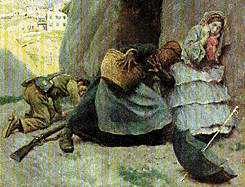 Image: Artist’s Depiction of Women Hiding in a Vicksburg Cave
Image: Artist’s Depiction of Women Hiding in a Vicksburg Cave
As the month of July approached, General John Pemberton began to see that he had done all he could to save Vicksburg. Seeing no chance of the help he hoped would come from General Joseph E. Johnston, Pemberton polled his generals as to whether a breakout was possible; they unanimously said no.
Finally, a truce was called to discuss surrender terms. Mary remembered:
I put on my bonnet and sullied forth beyond the terrace, for the first time since I entered. On the hill above us, the earth was literally covered with fragments of shell – Parrott, shrapnel, canister; besides lead in all shapes and forms, and a long kind of solid shot, shaped like a small Parrott shell. Minie balls lay in every direction, flattened, dented, and bent from the contact with trees and pieces of wood in their flight. The grass seemed deadened – the ground ploughed into furrows in many places; while scattered over all, like giants’ pepper, in numberless quantity, were the shrapnel balls. I could now see how very near to the rifle pits my cave lay: only a small ravine between the two hills separated us.
On July 3, 1863, Pemberton opened surrender negotiations with General Grant, who demanded unconditional surrender. Pemberton refused and demanded terms. With the help of General Bowen, who had known Grant before the war, terms were finally reached that Pemberton could live with. The Confederate soldiers must give up their arms, but they would be paroled (allowed to go free if they promised not to fight until exchanged on a one-to-one basis with Federal prisoners) and allowed to leave the city. Officers could retain their side arms, clothing and one horse each.
On July 4, Federal soldiers marched into Vicksburg, and Confederate soldiers, many angry and with tears in their eyes, stacked their arms. Mary wrote:
[My husband] came up, with a pale face, saying: ‘It’s all over! The white flag floats from our forts! Vicksburg has surrendered.’ He put on his uniform coat, silently buckled on his sword, and prepared to take out the men, to deliver up their arms in front of the fortification… I felt a strange unrest, the quiet of the day was so unnatural. I walked up and down the cave until [my husband] returned.
The day was extremely warm, and he came with a violent headache. He told me that the Federal troops had acted splendidly; they were stationed opposite the place where the Confederate troops marched up and stacked their arms; and they seemed to feel sorry for the poor fellows who had defended the place for so long a time. Far different from what he had expected, not a jeer or taunt came from any one of the Federal soldiers. Occasionally, a cheer would be heard; but the majority seemed to regard the poor unsuccessful soldiers with a generous sympathy.
When Pemberton surrendered, there were still ample supplies left in the city, but rations had been severely cut to make the food last longer. The caves, however, had done their job very well – during the siege less than 20 civilians were killed by the bombardment.
Accused of being a traitor for surrendering on Independence Day, Pemberton claimed he did so to get better terms. Vicksburg would not celebrate the Fourth of July for the next 82 years, until after World War II.
General John Pemberton never escaped the shadow of Vicksburg. In the aftermath of the surrender, he and General Johnston pointed accusing fingers at each other; Pemberton demanded but never got a court of inquiry. Vicksburg was his last major command; in 1864 he accepted a reduction in rank and served out the remainder of the war quietly in the eastern theater.
Mary and James Loughborough both died in Little Rock, Arkansas; he in 1876, she in 1887. They were buried together at Mount Holly Cemetery there. Their daughter Jean became a journalist.
